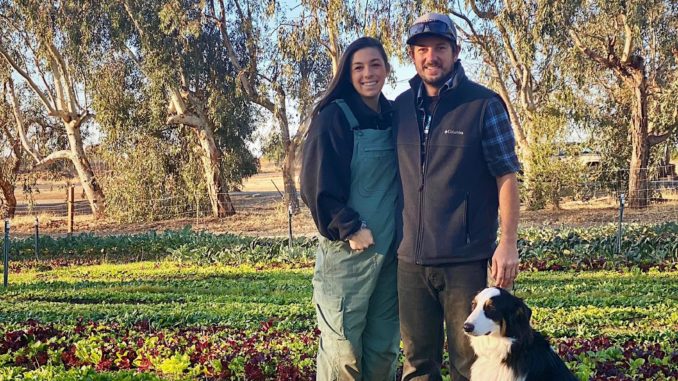
After stints farming in Italy and Hawaii, Aimee Zarzynski and her fiancé, Kevin White, decided to set roots closer to home, and started their own Gold Roots Farm in Corning in January. The couple grew up in Chico and attended Chico State, and got their introduction to growing food after joining the World Wide Opportunities on Organic Farms program, which connects organic farms with willing workers who exchange their sweat for room and board. As WWOOFers, Zarzynski and White spent two years on farms in Italy. They then moved to Honolulu, Hawaii, where they spent four years working non-farming jobs (event production for White and environmental consulting for Zarzynski), as well as growing all they could in a garden their landlord let them run. They returned home to be closer to friends and family, and their organic farm was born. You can order fruits, roots, veggies and greens and herbs online for pickup or home delivery, and you can find Zarzynski and White posted up at the Wednesday farmers’ market at the North Valley Plaza if you prefer to peruse in person. The CN&R spoke with Zarzynski about the couple’s experience abroad, returning home, and opening a farm during a pandemic
How was the first year at the market?
It was really good. I love the Chico farmers market. It’s such a good group of people and such a diverse group of vendors. It’s been awesome to connect with our community—that’s what we love to do.
Has it been tough to sell in person during the pandemic?
Yeah it’s been a big stress. We took two weeks off the market recently just to be extra safe, but overall it hasn’t affected us too much. People are still coming to the farmers market regularly because we all take safety seriously and they follow all the guidelines there. It’s an outdoor environment and people have been wearing masks. So, it’s been good that it was able to stay open.
How did your experiences in Italy and Hawaii translate to farming in the North State?
I think in Italy we really got a sense for loving the lifestyle of farming and loving just having a simple life where you grow things and you work with the land and intend to make it better. We definitely learned some techniques there for organic gardening that we use today. In Hawaii we continued to learn that, and even in the tiny space we had we tried to mimic succession planting so that we would always have food available. If we were growing carrots we’d have a couple batches ready after one another; and just doing a lot of experimenting with how crops grow and different pests that might invade them. We knew we wanted to come back to Northern California to be closer to family and closer to where we grew up. I think both Italy and Hawaii, their cultures have such strong ties to their roots and we really love that. We wanted to be closer to our roots, so we came back here and used what we learned from those places and started the farm. We’re still learning. There are different pests, the seasons are different here than Hawaii. There’s a lot to learn but I think we’ll be learning for many years to come.
How do you manage pests organically? Has that been difficult?
It hasn’t been too bad yet, we definitely have had some pests we didn’t have in Hawaii. We were lucky in Hawaii. Our backyard was the most diverse little ecosystem so we were really blessed there weren’t a lot of pests there. Here we have a lot more. One thing we’re struggling with a lot right now is our brassicas are infested by aphids. That’s been our biggest problem this year. Other than that it hasn’t been too bad. We just try to catch them early on if we can and identify what they are and then research a good organic way to combat them. One thing we do spray is neem oil, and we’ve also tried nematodes. It’s really just research. Also, moving forward we know that developing our soil over time will help. Having stuff growing, and having more biodiversity on the farm will help with pests. It doesn’t come immediately but it’s something we’re working towards. It takes time to establish all the plants. We’re getting there.
As you get close to your one-year anniversary, what’s your outlook for the year ahead?
We are trying to expand our farm right now. We’re in the process of taking the big picture and looking at what worked last year—what people liked and bought a lot of and what people didn’t really like or what didn’t really work on the farm—and then trying to take that data and apply it to our crops for next year. And we’re hoping to expand the area that we grow and hopefully sell at more markets and keep expanding our online store. I really want to connect people to the food that they eat, so I really want people to know what our farm looks like without even having to be here, and I want people to know how everything grows and what we do to combat the pests and what we do day-to-day. Why our produce costs what it does is because so much work goes into it, so I love showing that to people.

Be the first to comment